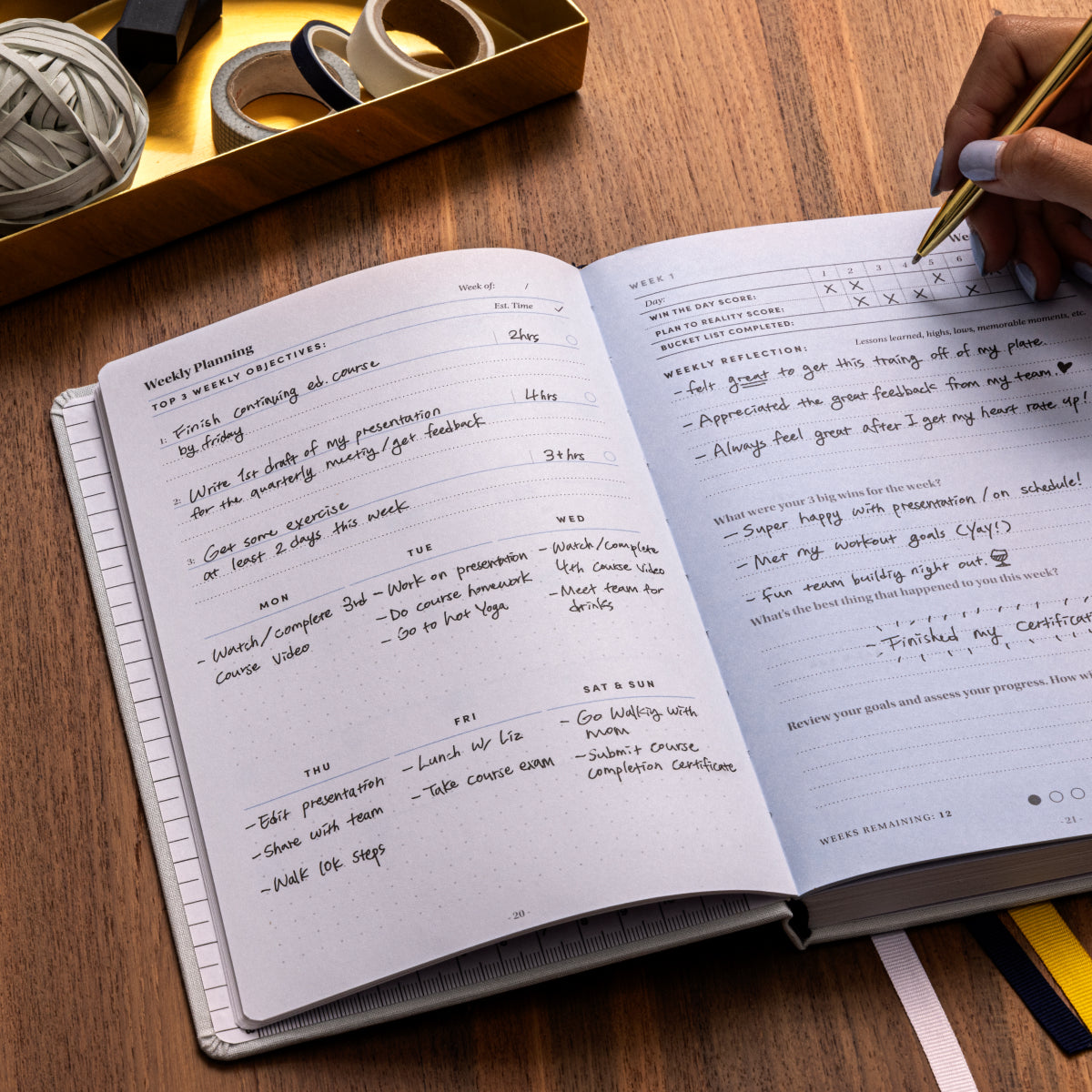How often do you find yourself wishing for more time? While you can’t add extra hours to your day, you can create the illusion that you have more than enough time to do it all. This is where daily planning techniques add so much to your life. As Jim Rohn says, “Either you run the day or the day runs you.”
Keep reading to discover 10 powerful and proven daily planning techniques. Use them to master your minutes, stretch your hours, and make each day a win.
1. Prioritize your to-dos
Not every task on your to-do list is completed equally. It’s the 80/20 rule where 20% of the tasks will contribute to 80% of your impact. If you have an overwhelming to-do list and little chance of getting everything checked off, start by prioritizing. Get clear on which tasks will move the needle the furthest and focus on completing them first.
Your Weekly Action Plan can help with this. Once all your to-dos are logged, use the PRIORITY column to indicate the importance of each task. You could use a code to help with this. For example, ‘1s’ are top priorities, ‘2s’ are important, ‘3s’ could be delegated, while ’4s’ shouldn’t be on your list at all!
2. Allocate time needed
When you have a lot on your plate it’s easy to overestimate what you can do in a day. This can slow you down. When you start out super optimistic only to realize there’s no way you’ll complete it all, your motivation plummets.
You can prevent this scenario happening by getting realistic about what you can achieve in any given day. A super simple way to do this is to decide [in advance] how much time you think each task needs. For example, you need an hour for your yoga class, 2 hours to write a blog, 90 minutes for that sales presentation, and 45 minutes to get on top of your emails.
When you can see how many minutes are required to complete each to-do, you can take on the right amount of tasks. That’s enough to stretch you a little, but not too many that you end up drowning in overwhelm.
3. Leverage deadlines
If you’re the kind of person who thrives under pressure, deadlines can help you get stuff done.
Instead of working from a to-do list alone, pin down when you want to get each task finished. It’s a simple planning exercise that helps eliminate Parkinson’s Law. This states that tasks will take up the time window you give it. So if that blog should only take 2 hours, but you give it four - that’s how long it will take!
With deadlines marked down, you force yourself to focus and work at a pace. You also force yourself to stay on track. It’s a simple, yet powerful daily planning strategy that will help you get more done.
4. Practice zero white space
In terms of managing your deadlines, working to a zero hours calendar is the perfect way to do this - it’s something your Self Journal’s daily timeline is designed to help you do.
Zero hours simply means leaving no white space on your timeline. At first this may sound overwhelming - that’s until you realize that you can incorporate breaks, relaxation, and fun stuff into your plan as well.
Time is your most precious, non-renewable resource. When you budget your time in this granular way, it becomes a lot harder to waste it. When you allocate specific timeslots to different tasks, you’re less likely to squander your minutes. This is why zero hours scheduling is a daily planning practice that helps top performers get top results.
5. Plan EVERYTHING
When your work keeps you busy or your business takes up most of your time, it’s easy to lose your work-life harmony. Work is the default priority and so gets your most focused time leaving everything else for the leftovers.
Most of us will have to work stupid hours and long weekends to deliver some projects. But when this pattern becomes the norm rather than the exception, not only do you risk burnout, but life can get very one-dimensional.
That’s why your daily plans should include everything you want to do - not just work stuff. Plan in your yoga class, coffee with friends, meal prep time, reading, social media, Netflix binges - in short, everything that you want to see in your day.
Remember, what gets planned gets done.
6. Keep plans in front of you
The best plans keep us focused and driven throughout the day. That’s why I recommend you keep your daily intentions in front of you - because you can’t ignore what’s staring you in the face!
Use a tool such as your Weekly Action Pad to keep your weekly plans top of mind.
Then map out your day in 30-minute chunks in your Self Journal. When you know what you need to do now, next, and later you reduce decision fatigue. Instead of wasting valuable minutes in between tasks, you can move seamlessly from one to the other. It’s a simple, but effective way to sharpen your focus so you can get more done in less time.
7. Make it a habit
Your habits are those things that you do on autopilot. As such, they require minimum conscious thought. Instead, you just do it! As you can imagine, good daily habits can profoundly impact your life. It’s as Sean Covey says, “Depending on what they are, our habits will either make us or break us. We become what we repeatedly do.”
So if you’ve not already, make robust daily planning a daily habit.
It can be tricky to train yourself to build a new habit. We’re human and we like our comfort zones - which means we resist change [even change that’s good for us!] The good news is you can hack habit building with a habit tracker such as the Habit Roadmap.
Simply check off each day that you successfully plan your day. You’ll quickly build a winning streak that you won’t want to break. Do your habit enough times and before you know it, it will become part of who you are.
8. Plan tomorrow, today
Be honest now! How much time do you spend each morning figuring out your day ahead? If you’re not careful, you can easily spend up to 30 minutes getting your head around your priorities and dropping into your work zone.
Imagine how much more productive you could be if you were able to hit the ground running - diving straight into your first task the second you sit at your desk rather than faffing with a plan.
It’s for this reason that some time management experts advocate planning tomorrow, today. It only takes a few minutes. There’s another advantage too. When your brain knows what’s coming up, it starts to process and come up with ideas - especially when you sleep. In other words, plan in advance and you could start the day with a rainbow of fresh ideas.
9. Reflect
We’re all different, which means some daily planning techniques will work like rocket fuel for you whereas others will fall flat.
The only way you can figure out the difference for yourself is to reflect. So take time to get clear on the planning techniques that light a fire and drain your energy. You don’t need to spend long. Just take a couple minutes at the end of each day and week to figure out what worked for you - then tweak.
It’s the power of marginal gains. Make a series of tiny tweaks over time and you’ll deliver compound results.
10. Use a daily planner
Your brain has a finite amount of bandwidth. What’s more, your brain isn’t designed to remember a ton of things. Instead, it’s better at problem solving, idea generation, and creative thinking. So don’t steal bandwidth unnecessarily by keeping your daily plans in your head. Instead, get them onto paper. This powerful practice will help you work smarter for a number of reasons. It reduces decision fatigue - because you don’t have to think about what’s coming up. It also keeps you focused by reminding you what you need to get done. You can also gauge whether or not you’re on track by comparing where you are in the day with where you wanted to be.
A tool such as the Self Journal can help with your daily planning:
Bill Gates said, “Most people overestimate what they can do in one year and underestimate what they can do in ten years.”
Daily planning techniques help to keep you accountable to what needs to get done so you can move the needle in a pace and direction that suits you.
Don’t risk making it up as you go along - you’ll waste a lot of time. Instead, leverage these powerful daily planning techniques. It’s an easy way to check off your to-dos, win the day, and ultimately achieve your goals.
Which techniques will you try?








Leave a comment
This site is protected by reCAPTCHA and the Google Privacy Policy and Terms of Service apply.